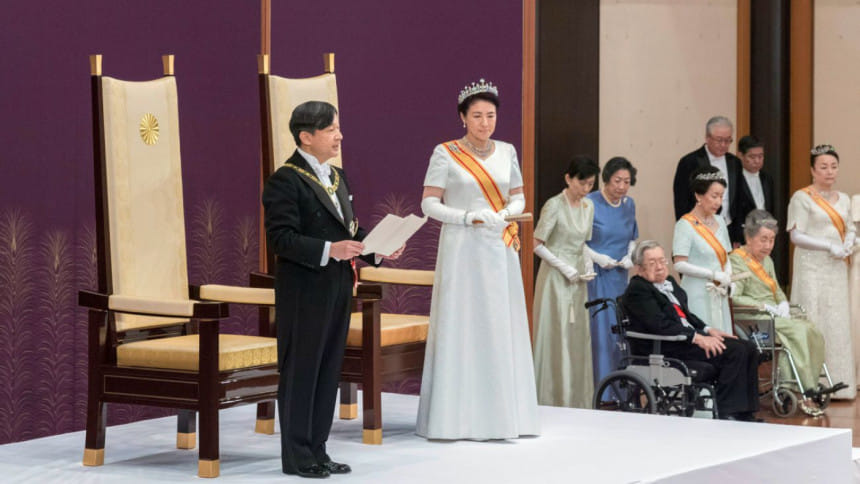Japan begins a new era

On May 1, 2019, Japan entered into a new era when the Crown Prince Naruhito, 59, acceded to the Chrysanthemum Throne following abdication, the day before, by his father Emperor Akihito, ending his nearly 30 years of reign, the first emperor to do so in 200 years.
The sacred ascension ceremony—during which a sword, a jewel and an official seal were handed over to the new emperor—was witnessed, among others, by the immediate successor to the throne, the younger brother of the emperor, 53-year-old Prince Akishino, his uncle 83-year-old Prince Hitachi, the Japanese cabinet led by Prime Minister Shinzo Abe and a host of political leaders, academics and social elites besides a handful of journalists.
Following an archaic imperial household law, there was no female guest to witness the historic ceremony. The wife of the new emperor, Princess Masako, who will be the new empress, was also not present during the ceremony. The lone woman making history to witness the event was the only female member in Prime Minister Abe's cabinet.
Historically, the Japanese people including the government and the private sector follow a new calendar with the commencement of a new era, and will now have to change the calculation of dates, months and years accordingly from the day of assumption of imperial power by the new emperor.
There is also a tradition of naming a new era when a new emperor takes power. The reign of Emperor Akihito was known as "Heisei", meaning "achieving peace". The new emperor's era will be called "Reiwa", with multiple meanings—"order and peace", "auspicious harmony" and "joyful harmony".
It is reported that the Japanese government had commissioned a panel of nine members to propose a short list of names for the new era, from which the name of Reiwa was chosen. While revealing the new imperial era's name a couple of weeks ago, Japan's Chief Cabinet Secretary Yoshihide Suga explained the meaning of the name as "culture born and nurtured while people beautifully bring their hearts together."
As in other monarchies in Europe and elsewhere, the imperial family of Japan is also closely followed by the Japanese people for they regard the imperial family as the direct descendent of the sun goddess. As a mark of reverence, Japanese commoners including the highest officials are not allowed to make physical contact (shaking hand, etc.) with the emperor or any other member of the imperial family. Any news or events involving the imperial family capture headlines in the media.
In 2002, a typical crisis arose in the royal household when then-Crown Princess Masako gave birth to their only child, a baby daughter. The birth of a female child, and not a male, ensued a great debate in the Japanese society with regard to the line of succession. As per the constitution, only a male heir can ascend to the throne. On the other hand, Prince Akishino, who was third in line of succession, also had two daughters and no son.
Noticing a demographic challenge in the imperial family, the Japanese parliament after much debate almost came close to the amendment of the constitution enabling a female royal to ascend to the throne. However, in 2007, dousing all speculations and anxiety, the wife of Prince Akishino gave birth to a baby boy, which brought an abrupt end to the matter altogether.
Not unexpectedly, though, the ascension to the throne by the new emperor has once again brought the issue of the right to succession by a female royal in the center stage. The present prime minister of Japan, Shinzo Abe, has pledged to upgrade the women's role in Japanese society and diminish the patriarchal system. It can then be assumed that the practice will consequently make an inroad into the imperial household.
I was privileged to serve as Bangladesh Ambassador to Japan from 2006-2010, which gave me a unique opportunity to interact occasionally with Emperor Akihito and Empress Michiko, Crown Prince Naruhito and Crown Princess Masako, and other distinguished members of the imperial family.
While presenting my credentials to Emperor Akihito in July 2006, I was pleasantly surprised when he recalled with fondness his visit to Bangladesh in 1974 as then-Crown Prince and his meeting with our Father of the Nation Bangabandhu Sheikh Mujibur Rahman, adding that he was very impressed by Bangabandhu's stature and handsomeness. He also enquired about Prime Minister Sheikh Hasina. In our subsequent meetings on various imperial occasions, he enquired about Bangladesh's social and economic developments.
Needless to say, Japan is one of the most trusted and time-tested friends of Bangladesh. Japan's contribution to our quest for development is undeniable. We also share many of the aspects of Japanese life. Thus, the continuation and further improvement of our bilateral relations with Japan is quintessential for the mutual benefit of both the countries.
Prime Minister Sheikh Hasina is reportedly likely to pay a visit to Japan in the coming months. Her programme in Tokyo should hopefully include an audience with Emperor Naruhito and Empress Masako. Sheikh Hasina may wish to use the occasion to extend an invitation to the imperial couple to visit Bangladesh in 2022 when our two countries will celebrate the 50th anniversary of the establishment of diplomatic relations between them, marking a new era of mutual cooperation.
Ashraf ud Doula is a former Bangladesh Ambassador to Japan.

 For all latest news, follow The Daily Star's Google News channel.
For all latest news, follow The Daily Star's Google News channel. 



Comments